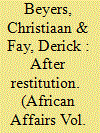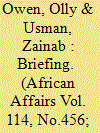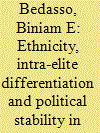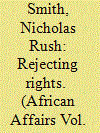|
|
|
Sort Order |
|
|
|
Items / Page
|
|
|
|
|
|
|
| Srl | Item |
| 1 |
ID:
139636


|
|
|
|
|
| Summary/Abstract |
This article considers the fracturing of “community” and the turn to litigation in the wake of nominally settled land restitution claims in South Africa. We describe emergent incongruence between groups of claimants, the projects of restitution, and the new legal entities that represent the claimants. As a result, discontented South African land claimants are challenging the new legal entities created in the restitution process, rather than the state and private sector actors upon which development-oriented Settlement Agreements depend. We focus on two of the earliest and largest land claims involving urban land and protected areas, District Six and Dwesa-Cwebe, but our argument extends beyond these cases. We then consider the implications of increased claimant litigation for the governance of relations between claimants and the state, and the management of dissent in the context of neo-liberalization. In concluding, we argue that struggles among claimants undermine the potential for more concerted action to address the shortcomings of restitution.
|
|
|
|
|
|
|
|
|
|
|
|
|
|
|
|
| 2 |
ID:
139637


|
|
|
|
|
| Summary/Abstract |
“A DO OR DIE AFFAIR” IS A COMMON DESCRIPTION of Nigerian elections, which underlines the competitiveness and acrimony that characterize the quadrennial political ritual. The recently concluded 2015 general elections were fiercer than most, with expectations that they would end in a contentious stalemate at best, and engulf the country in violent political crisis at worst. Many people stockpiled food, the affluent and many expatriate workers took strategically timed holidays abroad, and Nigerians in regions of the country distant from their birthplaces sent their families home in expectation of a prolonged post-election crisis. Yet, in the end, the actual conduct and outcome of the elections defied expectations. Not only did Nigeria conduct its most credible and transparent elections since independence with minimal violence but, for the first time in the country's history, an opposition party – the All Progressives Congress (APC) – defeated an entrenched ruling party (the Peoples' Democratic Party, PDP). The peaceful and credible conduct of these polls has set Nigeria on a trajectory towards consolidating its democracy, transitioning from a largely unstable and expedient experiment in 1999 to the realm of political maturity. This briefing discusses how this was achieved despite the challenging context.
|
|
|
|
|
|
|
|
|
|
|
|
|
|
|
|
| 3 |
ID:
139633


|
|
|
|
|
| Summary/Abstract |
Politics in Kenya remains vulnerable to ethnic tensions despite its openness and vibrancy, but it can also be argued that Kenyan politics is becoming increasingly mature. This article explains the political economy dynamics behind the first two orderly presidential successions in post-colonial Kenya. It proposes a conceptual framework that shows how instrumental ethnicity plays out in a quasi-differentiated society in which ethnic organizations are the key conduits for the flow of rents between political and economic elites. More specifically, it shows how the internal fragmentation of ethnic groups intensifies the structural uncertainties that are commonly associated with intra-elite pacts in weakly institutionalized polities. It is argued that the 1978 and 2002 presidential successions in Kenya were orderly, paradoxically, because some of the crucial political and ethnic organizations were fragmented to the extent that they created conditions of great uncertainty for the elite. In this context, the rule of law was upheld as a last-ditch strategy to mitigate uncertainties in the face of rampant fragmentation. This shows that ultimately elite fragmentation can generate political stability provided that there is enough at stake for the elites.
|
|
|
|
|
|
|
|
|
|
|
|
|
|
|
|
| 4 |
ID:
139634


|
|
|
|
|
| Summary/Abstract |
This article examines the political economy of grand corruption in Tanzania in the era of rapid growth and global integration. Grand corruption in Tanzania is linked to intra-elite conflicts within the ruling CCM party. However, the underlying dynamics of these struggles and how such elite politics interacts with the wider process of socio-economic transformation unfolding in Tanzania are not well understood. This article draws on the political settlements approach in building an analytical framework to examine four major grand corruption scandals that occurred within public finance from 2000 until 2014. In particular, it sets out the key actors and patterns in the factional struggles over corruption in order to demonstrate how the elite within the ruling CCM party is not centralized but composed instead of internal factions that have equal weight. The article explains how the enduring control of this elite, despite its internal divisions, can be explained by examining the balance of power in society beyond the institutions of the ruling party or the state itself. The article then establishes the mechanisms through which grand corruption shapes paths of accumulation within the domestic economy in Tanzania. In concluding, it argues that the fragmented distribution of power within the ruling party means that policy responses of the donor community, in particular the halting of aid disbursements, have been ineffective and are likely to continue to be ineffective in stopping grand corruption in Tanzania.
|
|
|
|
|
|
|
|
|
|
|
|
|
|
|
|
| 5 |
ID:
139635


|
|
|
|
|
| Summary/Abstract |
Effective local government taxation is critical to achieving the governance benefits widely attributed to decentralization, but in practice successful tax reform has been rare because of entrenched political resistance. This article offers new insights into the political dynamics of property tax reform through a case study of Sierra Leone, focusing on variation in experiences and outcomes across the country's four largest city councils. Based on this evidence, the article argues that elite resistance has posed a particularly acute barrier to local government tax reform, but that ethnic diversity has sometimes served to strengthen reform by fragmenting elite resistance. Furthermore, opposition councils have had stronger incentives to strengthen tax collection than councils dominated by the ruling party, in order to increase their fiscal autonomy. More generally, heightened electoral competition can lead to sustained revenue gains by encouraging city councils to adopt a more contractual approach to tax reform that stresses transparency, engagement, and equity.
|
|
|
|
|
|
|
|
|
|
|
|
|
|
|
|
| 6 |
ID:
139632


|
|
|
|
|
| Summary/Abstract |
Academic and policy interest in the emergence, development, and efficacy of rights has increased substantially over the last twenty years. One particular effect that scholars have recently identified is the connection between the spread of rights across the globe and large-scale reductions in violence. While the expansion of rights may enable reductions in violence, the evidence in this article suggests the opposite may also be true. Drawing on ethnographic research on vigilantism in South Africa, a country deeply invested in the twentieth century rights revolution, the article shows how vigilantes have used the state's expanding rights regime to justify violence. Specifically, it examines the growth and spread of what was at one time South Africa's largest vigilante group, Mapogo a Mathamaga. Mapogo first emerged shortly after the country's transition to democracy and rapidly grew as its leadership preached a gospel that rejected rights, claiming that rights enabled crime and allowed immorality to proliferate. By assaulting suspected criminals, Mapogo's members claim that they are correcting the criminal, the post-apartheid state, and the flawed rights regime on which it is based, an outcome which the existing literature on rights and violence has difficulty explaining.
|
|
|
|
|
|
|
|
|
|
|
|
|
|
|
|
|
|
|
|
|